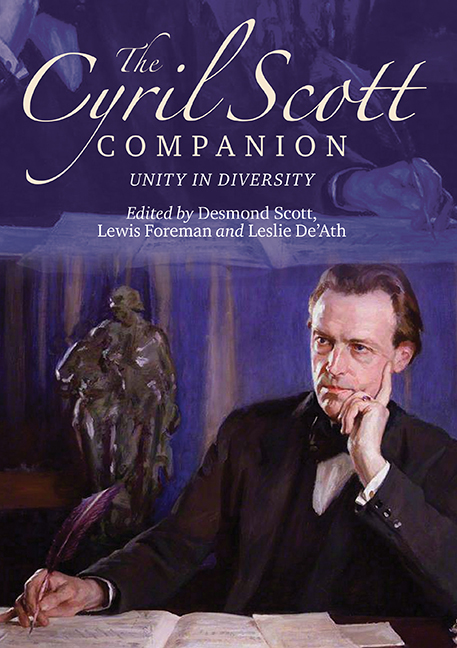Book contents
Preface
Published online by Cambridge University Press: 14 September 2019
Summary
THIS book is divided into chapters. Chapters 1–7 give some background to the work of my father, Cyril Scott; Chapters 8–16 are concerned with his music in its entirety; Chapters 17–23 deal with his writings; and Chapters 24–6 are reminiscences from those who knew him personally. To put the rest in context, this brief biography outlines the more significant events in his long life.
Scott's story as a composer is not unfamiliar. He achieved early fame as a modernist, acclaimed both in Britain and abroad, then mainstream music went in another direction until by the end he had been almost completely passed over. Thirty years after his death in 1970, however, a revival and re-appraisal of the music began that is still continuing today. Yet music was only the foremost of many other activities. He also wrote two autobiographies, My Years of Indiscretion in 1924 and Bone of Contention in 1969. An extraordinarily versatile man, he believed that the more subjects he became interested in, the less chance there was of being unhappy. Those subjects included poetry, philosophy, playwriting, painting and health.
Scott was born on 27 September 1879 to middle-class parents in Oxton, a suburb of Birkenhead, a ferry-ride across the Mersey to Liverpool. His mother was very conventional and a devout Church of England churchgoer. As Scott relates in his early autobiography, she entered a theatre only twice in her life and both times felt most uncomfortable doing so. His father was more open-minded. Professionally he worked in the shipping industry, Liverpool at that time being one of the busiest ports in England, but his real interest was in the study of ancient Greek. As Scott remarked, ‘he spent too much time studying the Greek Bible to accept the narrow interpretation of any one Church or clergyman.’
As a boy, Cyril showed a precocious talent for music and was fortunate in having a family that not only encouraged him but was wealthy enough to send him to the Hoch Conservatory in Frankfurt, a young institution that had begun taking students in 1878, just a year before Scott's birth. He first went to study piano in 1891, stayed there for eighteen months, then returned to England and began teaching and performing.
- Type
- Chapter
- Information
- The Cyril Scott CompanionUnity in Diversity, pp. xxi - xxviiPublisher: Boydell & BrewerPrint publication year: 2018



